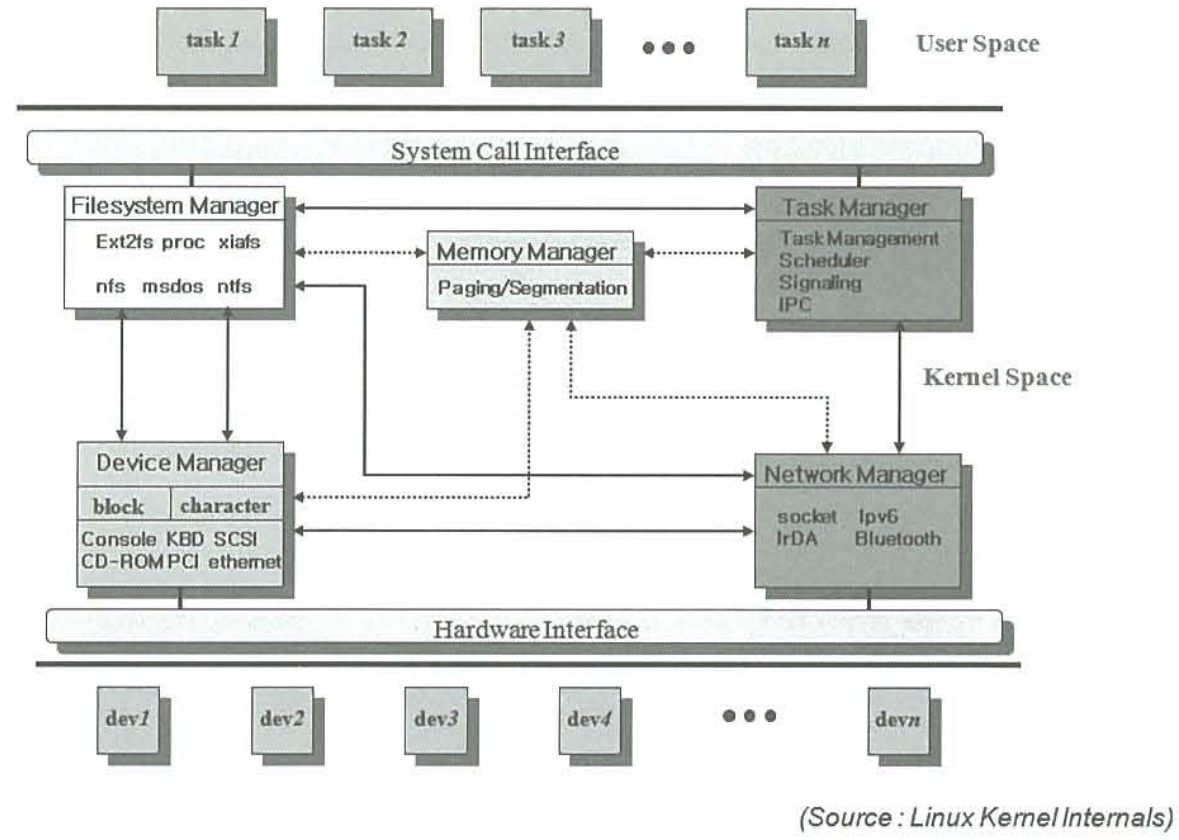Linux Kernel Structure
Linux kernel structure
- Operating System is a resource manager
-
Resource
Physical resource Abstract resource CPU Task Memory Segment, Page Disk File Network Communication protocol, Packet - Abstract resource only
- Security
- Access control
- Abstract resource only
-
Linux kernel’s conceptual structure

Linux kernel offers services in the user space with system calls through the system call interfaces.
- Linux Kernel (Conceptual Structure)
- Task Manager
- Task creation
- Task execution
- State transition
- Scheduling
- Signal Handling
- Inter Process Communication
- Memory Manager
- Physical memory management
- Virtual memory management
- Segmentation
- Paging
- Page fault handling
- File System
- File creation
- Access control
- inode management
- Directory management
- Super block management
- Network Manager
- Socket interface
- TCP/IP communication protocol
- Device Drive Manager
- Manage device drivers for Disk, Terminal, CD, Network card, etc.
- Task Manager
- Linux Kernel (Conceptual Structure)
- Linux kernel source level structure
-
Source tree under “/usr/src/kernels/” (branch “linux-4.19.y”)

- /kernel directory
- Implementation of the Task manager
- HW dependent task managing logics are in /arch/$(ARCH)/kernel.
- $(ARCH) is i386, arm, etc.
- /arch directory
- Acronym of “architecture”
- /arch/$(ARCH)/kernel
- $(ARCH) is i386(Intel), arm (Advanced RISC Machine), 68 series(Motorolla), Sparc(SUN), PPC(Power PC, IBM) etc.
- /arch/x86
Source Directory Description /arch/x86/boot bootstrap code for system booting /arch/x86/kernel HW dependent task manage code like context switch /arch/x86/mm HW dependent memory manage code like page fault handling /arch/x86/lib library function code used by the kernel /arch/x86/math-emu FPU(Floating Point Unit) emulator
- $(ARCH) is i386(Intel), arm (Advanced RISC Machine), 68 series(Motorolla), Sparc(SUN), PPC(Power PC, IBM) etc.
- /fs directory
- System call implementation like open(), read(), write()
- At least 60 different file systems are available for Linux
- Representative file systems are ext2, ext3, ext4, nfs, fat, proc, sysfs, devfs, isofs, ntfs, reiserfs, f2fs, xfs, etc.
- Virtual File System for offering consistent interface for user
- /mm directory
- Implementation of the Memory manager
- Physical memory management
- Virtual memory management
- Memory object allocated for each task management
- /driver directory
- Implementation of the Device manager
- Management and virtualization of Disk, Terminal, Network card, etc.
- 3 different device drivers
- Block Device Driver accessed by the file system
- Character Device Driver accessed by user application program through its device file
- Network Device Driver accessed by TCP/IP
- Others: 3 categories are not enough because of many kinds of different devices like USB, LCD, DSP, Sound, etc.
- /net directory
- Decent portion of the whole linux kernel source amount
- Many different network protocols are available like TCP/IP, UNIX domain communication protocol, 802.11, IPX, RPC, AppleTalk, bluetooth, etc.
- Implementation of Abstract layer of many different communication protocol
- Implementation of Socket offering user interface
- /ipc directory
- Implementation of Inter-Process Communication supported by linux kernel
- Representative IPCs are PIPE(/fs), Signal(/kernel), SYS V IPC, Socket(/net), etc.
- Implementation of message passing, shared memory, semaphore, etc.
- /init directory
- Implementation of main start function to initialize the kernel
- /arch/$(ARCH)/kernel:
- HW dependent initialization at “head.S” and “mics.c”
- Global kernel initialization at start_kernel()
- /include directory
- Linux kernel headers at /include/linux
- HW dependent headers at /include/asm-$(ARCH)
- other directory
- /Documentation directory for descriptions
- /lib directory for implementation of kernel library functions
- /scripts directory for scripts used when configure and compile the kernel
Physical resource Abstract resource Conceptual Manager Source directory CPU Task Task Manager /kernel Memory Segment, Page Memory Manager /mm Disk File File System /fs Network Communication protocol, Packet Network Manager /ipc Devices Device drivers for each devices Device Manager /driver - /kernel directory
-
Linux kernel compile
-
For new version of linux kernel, just compile and reboot the new kernel.
hello.out kernel executable hello.out bzImage or zImage stored at file system memory access level user level kernel level compile gcc gcc with make file -
3 steps for making linux kernel
- Kernel configuration
- Kernel compile
- Kernel installation
 Cool Wind on Study
Cool Wind on Study